#thinking. rotating
Explore tagged Tumblr posts
Note
cant wait to compare my luca thesis to yours whenever u post it
i love a guy with the nickname “ice man” who says i’m NOTHING like my eccentric older brother. who also volunteers to push the sisyphean boulder of that honda up a hill for two years. and sleeps entirely naked. and refuses to make the bed in the morning. and needs one BILLION alarms to wake up on time. a little chestnut of contradiction rests at the heart of him methinks.
#thinking. rotating#i’ve man conjures like. a fastidious persona that seems to be contradicted by some of these recent little insights….. interesting…..#motogp#callie speaks#asks#luca marini#joan mir coming off so much more like. put together life wise and time management wise than luca in that recent insta vid#would not have called that !
63 notes
·
View notes
Text
I'm curious. Tag this with your sexuality and what your favorite M/F ship is.
#i'm a lesbian and i kinda cycle through a few of them#right now i'm rotating buttercup and westley in my mind and i keep seeing the zelink au of them which makes me think of them too#idk if anyone will actually do this! but if they did that would be really cool#i wanna see the data
16K notes
·
View notes
Text

I think my copy of the game is broken they've been doing this for 30 minutes
Crop of the Biolizard edit I did bc it makes me laugh:

#art#sonic the hedgehog#sonic#shadow the hedgehog#rouge the bat#their dynamic is so funny to me like hello what episode of Untucked is this#I am rotating them in a 2 bed 1 bath apartment in my mind#Also very proud of how this turned out I think I'm finally finding a comic rendering style that doesn't make me want to rip my hair out#Simplify baybee it's a comic not an illustration you can get a little crazy with it#Spoiler alert. Getting looser with lineart and better at colour schemes and simplifying shading. Is good actually.#It's so much easier to eyeball what a colour would look like in a setting instead of colourpicking the OG palette and struggling with...#...like 9 overlay and multiply and soft/hard light layers#Approximating colour genuinely looks better than forcing local colour into the piece. As long as the values are still there it works out#comic
10K notes
·
View notes
Text
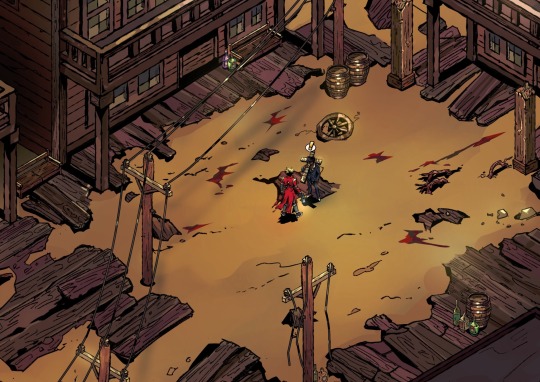
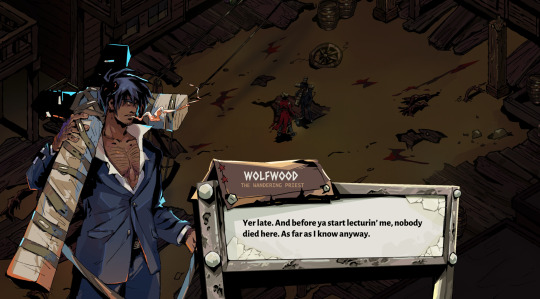
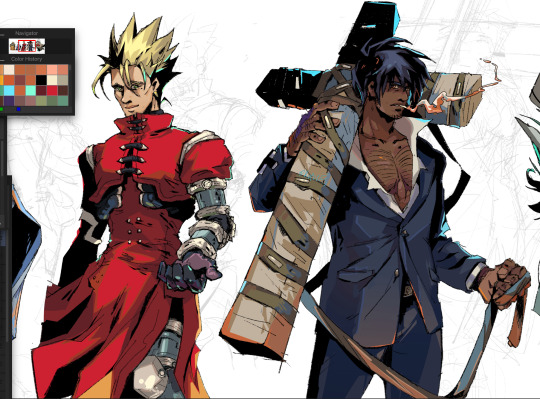
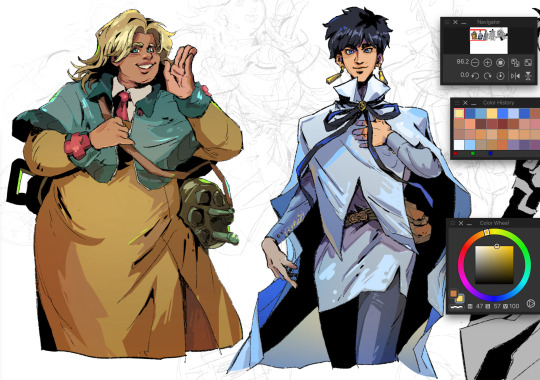
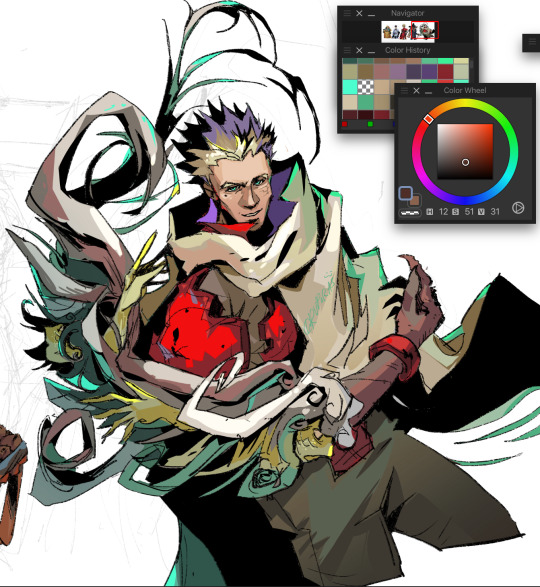
trigunned the hades or hadesed the trigun (id in alt)
#trigun#trigun maximum#nicholas d wolfwood#vash the stampede#meryl stryfe#milly thompson#millions knives#ruporas art#type of shit ive been on lately bc ive been playing an obsessive amount of hades 2 lmfao… ofc imstead of drawing fansrt for hades#i channel that energy into trigun?😭 SEE.. the thing is. i am ALWAYS thinking about a trigun game… like an action story game#it is rotating in my brain 24/7 and now after 7billion years i finally pick up a video game#and the inspiration sparked. obviously this is just a mere mimic of an existing media... but im thinking about the plot of max now#executed differently between mediums… webbing a new retelling of the original story as game mechanics allows you - thinking of the#new roles the characters would take. like wolfwood here is not Constantly by vash’s side but he will show up once a run to clear out an#encounter. shows up seldomly at home base to make gifting difficult... an existing companion and still journeys on his own. for more#relations options merylmilly will also have occasions where they separate so vash can speak to them individually - the gungho are not bosse#most of them get the roles of giving “boons” i think.. BUT ANYWAY thats me reimagining trigun into hades. now imagining trigun into an#ORIGINAL video game.... ough... ohhh....guhh... I WANT IT SO BAD!!!!!!!!#this was just a fun exercise... im thinking about doing more but i think i shouldactually draw some hades 2 fanart first
8K notes
·
View notes
Text

there's a stranger who sleeps at the foot of your bed
#rotating the first few nights that loop is in the party in my head. argued into sharing a room because its a downpour outside.#only accepts a bedroll. not a bed. (because they don't deserve a bed) because stars don't really need to sleep! it would be silly!#who is this person. who are they to your partner. why do they look at you like that. at him like that. you can't tell what theyre thinking#isat fanart#isat spoilers#in stars and time#in stars and time fanart#isat loop#isat siffrin#isat isabeau#isiloop#sloopis#lucabyteart#sifloop#isafrin#isaloop#(help me god thats so many ship tags. have fun interpreting this post your chosen way guys.)#but yeah. had to torment that man again sorry isabeau its just the way it goes. i need to unsettle you as hard as possible thanks#>be me >be 2 months into my relationship at best >still havent kissed the guy >the fucking babadook shows up >tfw
2K notes
·
View notes
Text

"If the original novel had given this thing more than ten words of description, there was no way he wouldn’t have remembered!"
#svsss#shen qingqiu#zhuzhi lang#sqq#zzl#is this a ship? do they have a ship tag?#anyway i'm just feeling slightly obsessed with the dynamic of:#ZZL: i am a strange hideous creature [derogatory] vs SQQ: that's a strange hideous creature [affectionate]#@mikkeneko thank you! i'm glad you like his design! bc man am i ever having fun drawing this snake boy#expect more in the future#my art#you know when it comes to mdzs/tgcf i'm pretty solidly ''yes i like the main ship no i refuse to entertain any variations on it''#whereas so far in svsss i'm team ''throw 'em all in a blender hit puree and see what comes flying out''#specifically i think sqq deserves an unwitting harem and i will rotate every bizarre dynamic that spins off that in my head#zhushen
2K notes
·
View notes
Text
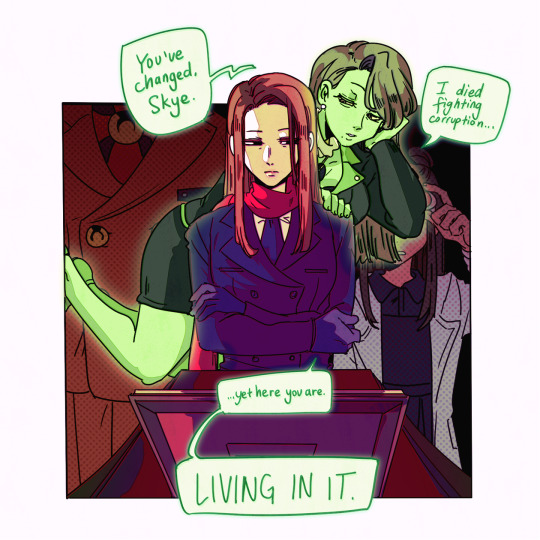
day 15: haunting ♡
(femslashfeb prompt list)
#HALFWAY THROUGH??!#minifemslashfeb2024#ace attorney#lanamia#lana skye#mia fey#rotating them in my head#what if ghost mia DIDN'T agree with lana#I should add that my original concept for this was#that ghost mia is just a projection and lana is just imagining her spite post-mortem#as one does when they are not in a good state of mind#but I also think if mia genuinely disapproved of her actions... that would be so interesting#either way I think it should haunt lana#I just think that would be interesting#like what if mia asked about it when she was alive and investigating corruption#and lana deliberately lied to her#those kinds of regrets...#I love ghost stories...#me wanting mia to actually haunt the narrative...
7K notes
·
View notes
Text

picked up an old pen
#my art#jujutsu kaisen#jjk#jjk fanart#jujutsu kaisen fanart#gojo satoru#jjk gojo#jjk satoru#satoru gojo#big messy gesturey lineart is so fun i shld do it more#maybe i will#this new style is very much still in flux i feel#like there's an underlying Look but none of my methods r solid and im rotating brushes like no one's business#like this pen#i normally dont go fr pen brushes bc a lot of them don't taper#u can't play with line weight as easily#but i think it looks so cool when other ppl do it so i thought sure#i love how quick n loose it lets me b#its like a single line drawing where every movement has to b rly intentional#biiiig folds. only th most essential#i had fun !#this also is the least frustrated ive ever been rendering gojo's hair so ill count that as another win
1K notes
·
View notes
Text


Roughly 20 years apart 🥺
2K notes
·
View notes
Text







Assorted Gravity Falls doodles!
#Havent posted anything in a few days cause I keep rotating too many ideas in my brain. These are just some wips. Anyway doodle notes! ->#had to draw twink!Bill okay. Being a pretty boy was like Annatar's whole Thing. & OBVIOUSLY I had to draw Celebrimbor & Annatar Billford#As many pointed out on my LOTR comic Ford would have seen the 80s Animated movies! I may do a post on my thoughts(tm) of him watching it#but to tdlr I think he missed Bashki's Movie in movie theatres and watched it with fiddleford in november 1981! :3#Anyhow was thinking about Trans!Fiddleford & the DOOMED T4T potential of Emma-may also being trans hit me like a truck. I have many thought#Stan: Quit worrying Pointdexter. not like Mabel can find ANOTHER annoyingly smart & gruff yet whimsically eccentric Grunkle to bond with#Mabel * dragging in a bedraggled 12th Doctor *: Guess what I found in the woods!#<- I think Ford should feel socially threatened/jealous and be pushed into being a better grunkle because of it <3#Second to last is PURE indulgence as I am a big Dr Who fan and the Last is Ford after watching Jackson's trilogy ;)#Gravity Falls#GF fanart#Fanart#fan art#Bill cipher#stanford pines#ford pines#grunkle ford#fiddleford mcgucket#young fiddleford mcgucket#young stanford pines#Emma-May Dixon design#doctor who#twelfth doctor#mabel pines#crossover#sketch dump#artists on tumblr#my art
1K notes
·
View notes
Text

congratulations to @fluffffpillow and @jencilthepencil for making the Most Characters Ever. Both of them have been living in my head rent free for months, and they keep trying to kill each other. It's getting dire.
I decided to give phantasmo a lil skull nose cause my style is a little more realistic and he looked a bit odd without it. I'm actually really proud of how this came out cause it's a brand new technique I'm learning to work with!! Total work time was about nine hours :>
as always, click for better quality!
#dr. phantasmo#oc: charlie#cuphead oc#fluffffpillow#jencilthepencil#fanart#art#tw: blood#oc: dr. phantasmo#digital art#cuphead#i just think they're neat *rotates them rotisserie chicken style*#telltown#charlie champ
1K notes
·
View notes
Text
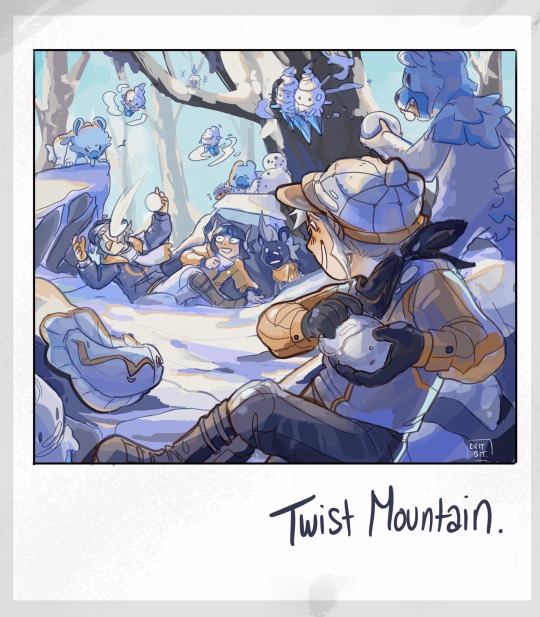

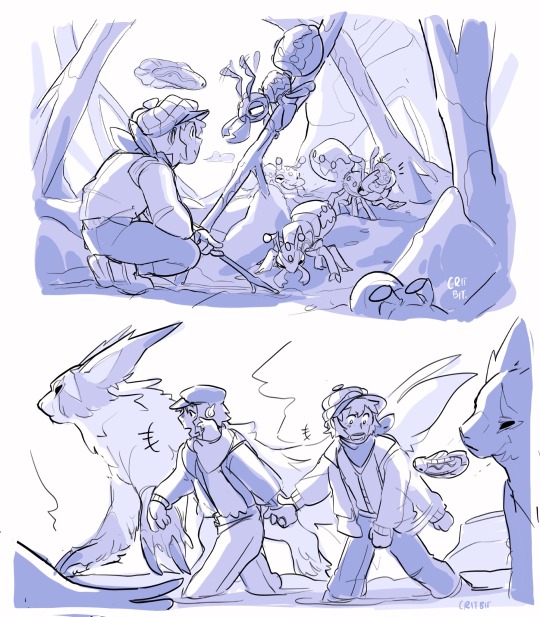
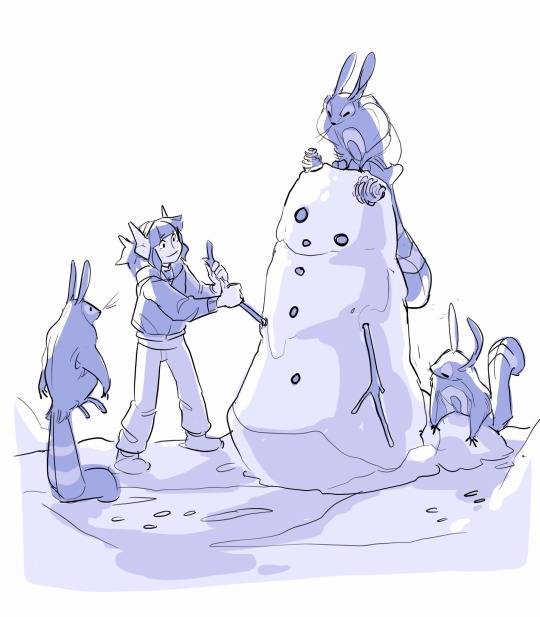
Tis the season on Twist Mountain! Elesa, from Sinnoh, happily tromps around in the cold. Emmet remains undefeated champion of snowball fights. Ingo shivers his way across the clearing.
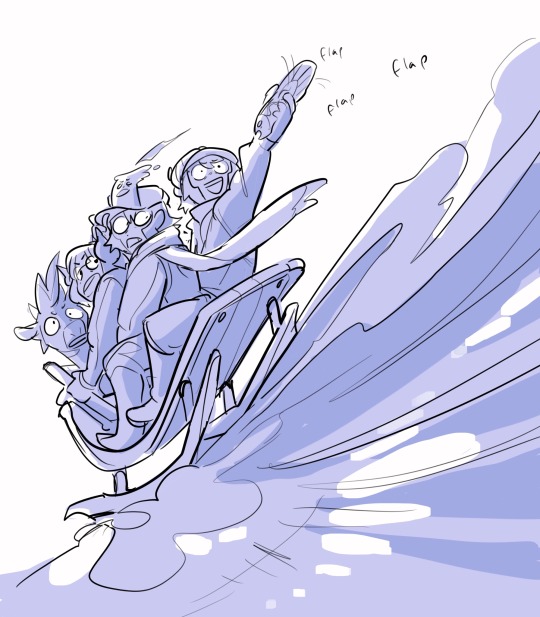
Look at em go!
Masterpost for more pokemon!
#unova has a rotating weather system and i love it#when its winter snow blankets certain routes. freezes puddles and changes the map.#and sinnoh’s snowy year round#idk i think elesa would like the snow#emmet thrives year round he’s a hardy lil fellow#ingo does best during summer like some sort of helioptile soaking up the suns eays#pokemon#sketchbook#art#submas#nimbasa trio#myart#fanart#pokemon ingo#submas comic#pokemon emmet#pokemon elesa#twist mountain#litwick#dwebble#tynamo#blitzle#vanillite#vanilluxe#cubchoo#cryogonal#durant#zangoose#sentret
4K notes
·
View notes
Note
Hey plant man, I like your plant posts. Should give us a lil plant post to rotate in our brains if you have some time. Take this as permission to sling spaghetti at the wall for whatever Plant Stuff has been in ur head
(I also feel like i should tell you that I cannot for the life of me remember when I started following this blog but going through your lichen posts had me telling all my direct family members how much lichen now baffles me, so thank u for reminding me that Science Does Not Know All)
for years i've strongly envisioned a plant museum exhibit i would make if i ever became the guy who got to do that. imagine the biggest wall in the exhibit dedicated to showing how lepidodentrons became modern plants (and it would be utilized for that instead of some crowd pleaser dinosaur because of isoetes favoritism for me only, i would insist the space be used like that instead of something more cohesive. I would take the public and say LOOK AT IT). it starts at the left side with a life-sized lepidodendron silhouette and shows species getting smaller and smaller along the wall until the far right, where there's an aquairium with isoetes collected from the closest healthy isoetes population, preferably in the same area so people can be like 'whoa so close to us'.
version two of this exhibit would be to just have a tank of local isoetes beside a life-sized lepidodendron silhouette or replica so you could compare the sizes more directly. version three of this exhibit would be to put a tank of isoetes at that place in scotland that has the grove of fossilized lepidodendron stumps still upright in place from when their grove got flooded for the last time.
any of these would have merch in the gift shop too by the way.
#isoetes#asks#plont asks#ive been rotating isoetes in my mind again since ive been applying for jobs. just thinking about them again#like dude theyre just so crazy. just absolutely baffling creature#paleobotany#science communication
822 notes
·
View notes
Text
Been thinking about how Bill legitimately had a horrifying reason (the literal progressive disintegration of the nightmare realm that erases whatever it disintegrates from existence completely) to move himself and his crew into a new dimension. Like that's terrifying. And yet he never utilizes this to his favour. He could have been honest about this with Ford, and you KNOW as long as Bill didn't mention plans of overtaking the earth, Ford would've made the portal for him, both out of Ford's own interest and because Ford when faced with these big moral questions will pull through. But this is a card Bill NEVER plays because although he needs to leave the dimension, he cannot lose face. He can't put aside his pride and admit to the humility that he needs to flee from his dimension, that he's not actually all powerful. And so instead he pretends to be a muse and when Ford figures out something else is going on, instead of being open and humble and saying that his dimension is unravelling, Bill focuses on that he's going to over take earth, that he's actually been a monster all along, surprise Ford!
And part of it is definitely because Bill's built himself up on power and violence and to grovel and earnestly ask for help, to admit that he cannot stop the unraveling of his dimension completely invalidates that; showing vulnerability? Can't do that, even under the guise of lying to get his way. And part of it makes you wonder if it's also a form of self-sabotage, because underneath his deep denial Bill is guilty over what he occurred; he sees himself as a monster and so he'll be that monster, and having people recognize that feels good in the same way that pressing a bruise feels good. But it makes you wonder what would've happened if Bill even just was open about his dimension unravelling and had lied about overtaking the earth.
It's also interesting because although Bill has SOME charisma and can manipulate people decently well (as evidenced by his cult, and pandering to people's desires with Ford, Mabel and Blendin), he refuses to be vulnerable, refuses to not be true to his off-putting self, even when if he was just vulnerable of pretended to not be himself, to put aside the (false) pride he has in himself he would've gotten a portal by now. and part of me wonders if it's because it's this false pride that built on insecurity and denial on who he is he cannot drop that mask.
Further thoughts on this!
#hugin rambles#hugin rambles gf#uhhhh yeah anyways Bills a delightfully complex character#and I think thats why also Bill fell hard for Ford is because Ford was vulnerable with Bill and actually CARED for Bill and got to peer#into the vulnerable bits of Bill and cared for him#but yeah fascinating. rotating him in my head whooo#bill cipher#billford#the book of bill#TBOB#gravity falls#but seriously the idea of Bill becoming honest with Ford instead of being like HAHA I TRICKED YOU bounces around the ol noodle with vigor#like dude thats a HUGELY typical self sabotage thing. like why YES im what people think i am.#hes interesting because hes good at manipulation. but also at the same time bad at it because he refuses to not be himself.#which... yanno i can respect. truth to being yourself even if thats offputting and annoying. but certainly makes it more difficult#re: manipulation. and then there was ford who was just. really into Bill in entirety#congrats! you guys match each others freak and toxic neediness to the t#gravity falls meta
914 notes
·
View notes
Text

Help he’s just too cute I can’t stop drawing him. 😭💀
#dragon age#dragon age the veilguard#DAtV#Emmrich volkarin#my art#grahhhhh Emmy on the mind rotating like a rotisserie chicken#even tho some old fixations reared their heads recently#he’s still dominating#sooner or later the muse will calm itself tho#and I’ll have no clue what to doodle#always happens just a matter of when#but for now I’m just enjoying being able to doodle faves#kiss him he deserves it#was also thinking about potentially drawing spicy too#but those obv won’t be on this account if so#shall see
821 notes
·
View notes
Text
Kabru, impossible mutual understanding & unknowable objects
Despite his concerted and constant efforts to understand other people, it’s established in a few extras that Kabru believes that true mutual understanding between certain different races is impossible. Specifically, between long-lived and short-lived races, and between humans and demi-humans. Partially, we can trace this conviction back to specific hang-ups caused by his life; the trauma of the Utaya disaster, prejudices he carries from his childhood, and his experience of racism among the elves. In this “little” essay, I’m gonna discuss how I think those experiences formed this belief, how it comes out in his actions, and how some of his actions seem to contradict it. The question of whether it’s possible to reach mutual understanding with other living beings despite our differences is one of the core themes of the manga, and I’ll also touch on how this aspect of Kabru’s character links to that.
Seeking understanding
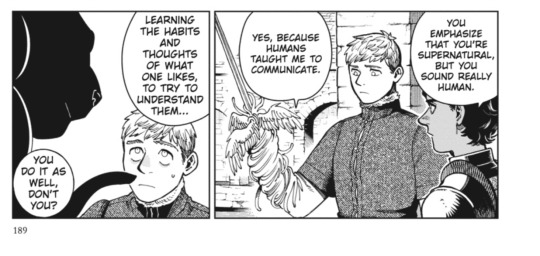
Kabru is a character who devotes a huge amount of time and effort to understanding people, and he is very good at it. In his internal monologue, we can tell how advanced and complex his skills of analysis are. He is able to read a huge amount of information just from looking at people's faces and body language.


People are, to him, what monsters are to Laios. This is something that's been expanded on at length in other, excellent meta. It's the fact that they're foils; it's the fact that Kabru is also very easy to read as autistic, with a special interest which is the opposite and parallel of Laios'. It's something that came out of trauma and alienation, as Laios' special interest in monsters also began as a coping mechanism.
The complicated origin of this "love" for monsters and for people comes through, I think, in the fact that one of the places we see both characters use their fixation is in being very, very good at killing the thing that they love. This also ties into the idea that loving something isn't even remotely mutually exclusive with using it to sustain your own survival; using it for your own purposes; hurting it or killing it. Love can be, and often is, violent, possessive and consumptive. This understanding is part of what makes Kui's depiction of interpersonal relationships so compelling to me.
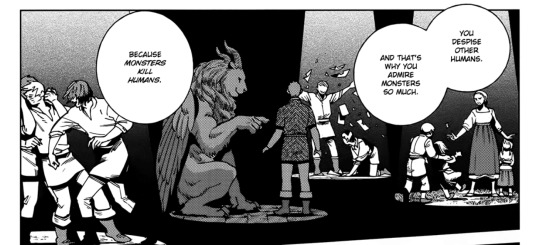
While Laios fixated on monsters and animals to seek a place of escape, in both his imagination and his self-image, from the humans who he couldn't understand and who couldn't understand him, Kabru seems to have fixated on understanding people in order to navigate the complex, socially marginal places that he has been forced into throughout his life. As an illegitimate child raised by a single mother with an appearance that marked him out as different to the point his father's family wanted to kill him, and a tallman child raised among elves who didn't treat him as fully human and wanted him to perform gratefulness for that treatment – treatment that, after he met Rin at age 9, he certainly always understood could be a lot worse – his ability to work out what people wanted from him, whether they were friendly or hostile or had ulterior motives, wasn’t just an interest. It will have been an essential skill.
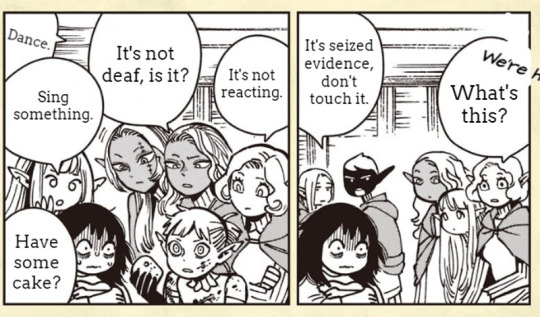
Milsiril, I think, was a flawed parent who tried to do her best by Kabru and did a lot of harm to him despite her best intentions. She may have treated him much better than an average elf would have, but like Otta and Marcille's mother, there are other elves with different outlooks on short-lived races. How would they judge her treatment of him? We don’t have any insight on what it could be, but to be honest, the person’s whose opinion of her I’d be most interested in knowing is Rin’s.
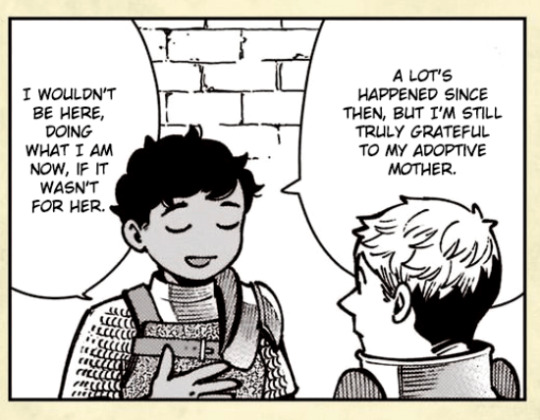
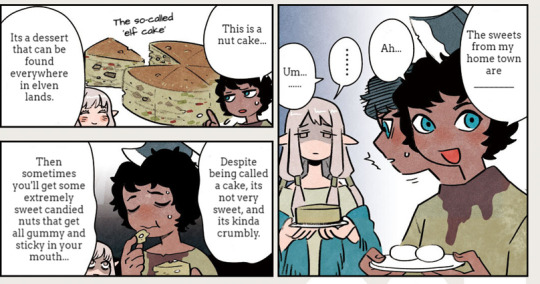
But even if she'd been perfect, living as an trans-racial adoptee in a deeply hierarchical nation with a queen who is a 'staunch traditionalist' who wouldn't even acknowledge the existence of a half-elf like Marcille (according to Cithis) is an experience that would deeply impact anyone.
Elves & Impossible mutual understanding
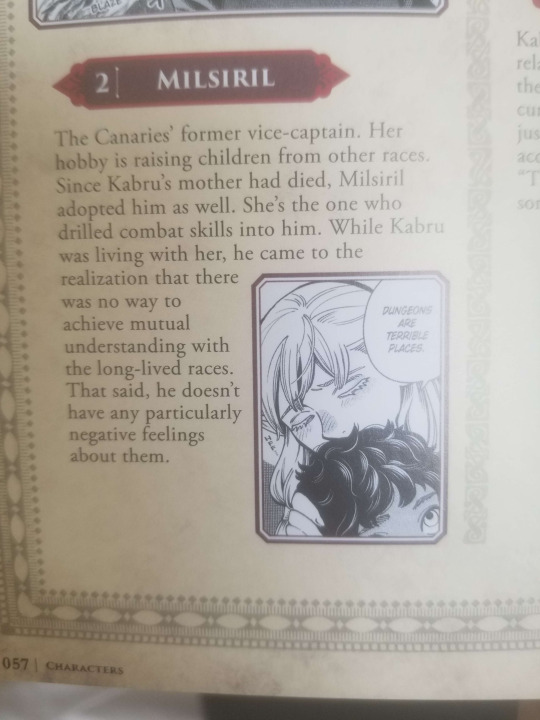
While Kabru was living with Milsiril - in other words, while living in the Northern Central Continent - he came to believe that "there was no way to achieve mutual understanding with the long-lived races."
This is evident in his political project: he wants short-lived races to have ownership over the dungeon's secrets. Despite his dislike of the Lord of the Island, he's a useful bulwark to stop the elves taking over. Despite his doubts about Laios, Laios needs to be the one to defeat the dungeon, because if he doesn't the elves will take over.
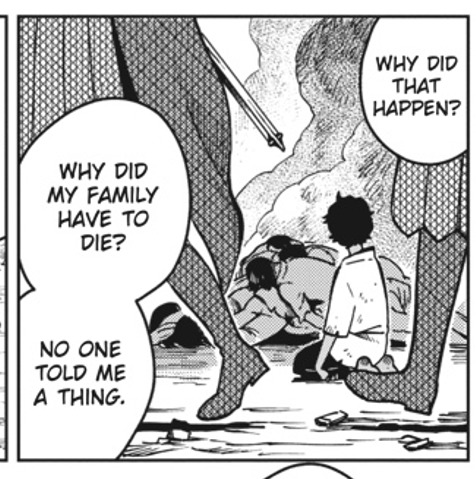
Kabru still carries a deep scar from Utaya, one that was exacerbated by the fact that he never got an answer to any of his questions about what happened or why. This, despite the fact that Milsiril knows about the demon and how it works. Do you think Kabru, with his social perceptiveness that borders on the superhuman, wasn't aware that she knew more than she would tell him?
Given that, the fact that he gets to a place where he "doesn't have any particularly negative feelings about [elves/long-lived species]" .... well, to put it bluntly, I believe that he thinks that's the case, but I kind of doubt it. After all, if he did have resentment, of Milsiril (someone who was his primary provider and caretaker since age six, and who despite her flaws, loves him and who I do think he loves) or of elves (who he has had to play nice with for most of his life, in order to survive, and will still have to play nice with in order to achieve his goals, since they hold all the power) what would that do except hurt him and make his life harder? Kabru is Mr. Pragmatic, so I don't think he'd let himself acknowledge any such feelings he did have. Exactly because he can't acknowledge them, they're well placed to get internalised as beliefs about the Fundamental Unchangeable Nature of the World.
However, these stated beliefs seem to contradict his actions. Despite his belief in the impossibility of forming a mutual understanding, he certainly seems to try to understand long-lived people, just as much as he does short-lived people. There's no noticeable difference between his treatment of Daya & Holm versus Mickbell & Rin that isn't clearly down to their relationship with him. His skills of human analysis were honed and developed while living amongst elves, and as soon as he's alone with Mithrun he immediately sets to understanding him - his interests, his motivations, his needs, and his past.
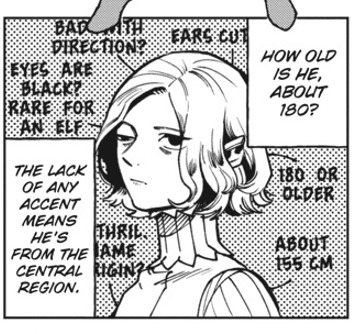
He treats him considerately and without bias, and despite the fact that Mithrun conquering the dungeon for the elves is both a reenactment of a core part of his childhood trauma and a political disaster for his aims, that doesn't seem to colour his perspective on Mithrun negatively at all.
This is something I find extremely laudable about Kabru, and it's another way he parallels Laios. He seems to understand that people, as a rule, (in Laios' case, he understands this about monsters - and eventually, all living beings) will act in their own interests, and if those interests conflict with yours, might harm you. But that's just their nature, and it's not something that should be held against them; you're also doing the same thing, after all. The crux of Laios' arc is precisely that he has to accept the responsibility of hurting someone else in order to achieve what he wants.
Kabru is deeply concerned with his own morals, what he should and shouldn't do, but mostly in the context of responsibility for the consequences - a responsibility he takes onto himself. He isn't scrupulous about what he needs to do in order to create the outcome he wants, but if he fails to create that outcome, then....
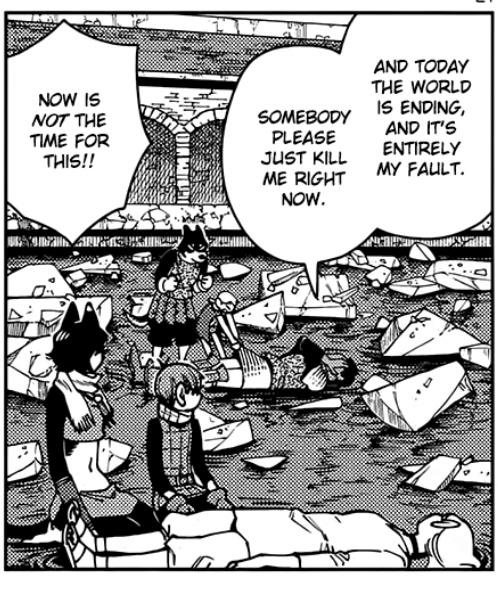
He blames himself to the point of thinking he should die. He doesn't blame Laios, or seem at all angry with him, despite concluding he should have killed him to prevent this outcome. That's because in his eyes, ultimately Laios was going to act according to his own nature, and it's Kabru's fault for not understanding that nature well enough. He's extremely confident in his ability to understand and predict others, (including elves and other long-lived people). Then, where does his conviction that mutual understanding is impossible come from?
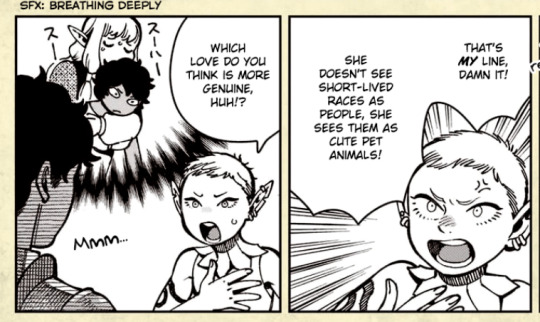
Partially, it's the "mutual" part. I'm sure Kabru, who isn't able or willing to deny Otta's insinuation that Milsiril saw him more like a pet than a son, has felt that his full interiority, the depth of his feelings and his ability to grow, act, and think as a fully equal being, was something that the elves around him just couldn't grasp. Because that was their excuse for it, he came to understand this as a gulf between short-lived and long-lived beings, an inevitable difference in outlook caused by their different lifespans.
This experience might be part of what leads to his iconic “fake” behaviour. He trusts his ability to understand others, but if they aren’t able to understand him, then there isn’t any benefit to being honest about his feelings and thoughts. If his attempts to reach mutual understanding with his caretakers were never able to be fulfilled, then it isn’t any wonder that he reacts with such surprise and horror at blurting out his desire to be Laios’ friend.
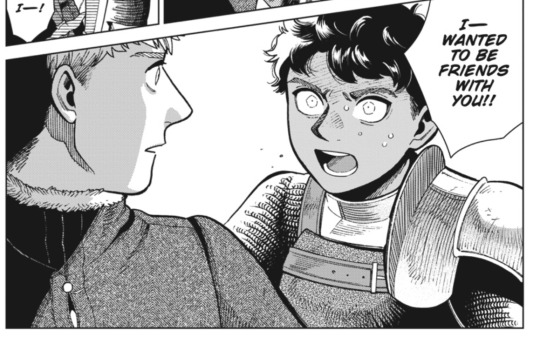
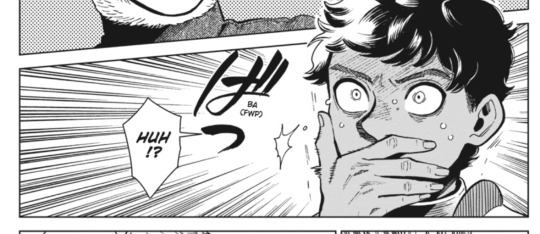
In his experience, making yourself vulnerable in that way only leads to being hurt. Soothing him, hushing him, lying to him, talking to him like a child that isn’t able to use proper judgement – that’s an inadequate and deeply hurtful way to respond to genuine distress, the desire for autonomy, or disagreement. Ultimately, I think that’s why he comes out on the side of being grateful to Milsiril; because she did equip him with the skills and knowledge he’d need to reach his goal, and let him go.
Though he could understand them, they couldn't understand him. To the extent that was true - which I'm sure it was - it wasn't due to anything about lifespan. It was due to the elves’ racism, and the solipsitic mindset & prejudiced attitude that it caused them to approach him with.
Because, if it needs to be said, the idea that there is an unbreachable gap in understanding between the long-lived and short-lived species is not true. Marcille and Laios have a much greater difference in lifespan than any full elf from any short-lived person, and they’re able to understand each other – maybe not perfectly, but better than many other people who are closer in life-span to them.
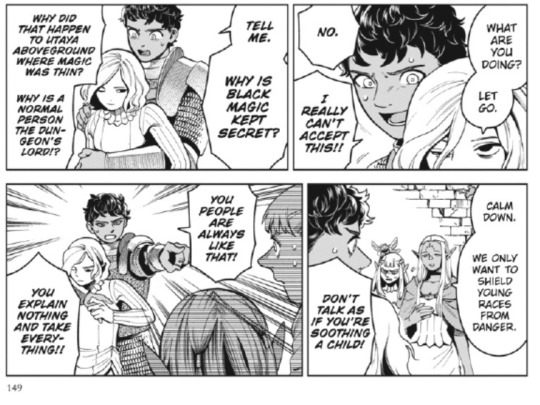
That doesn’t mean that I think Kabru is wrong about this, however. Because there’s an interpretation of his statement that is reflected in his actions and is true. When he talks about his problem with elves, it’s not just their attitudes: it’s their power, and what they use it to do. They “explain nothing and take everything”. Though it’s presented in the guise of ‘guiding and protecting’, in fact it’s a simple case of a powerful nation using their military power, wealth, access to resources, and historically stolen land – including the island itself – to protect their own interests and advance their own agenda. That’s why they’d be able to show up, seize the dungeon, and forcibly take Kabru’s party and Laios’ party to the West. If Kabru wants to stop that from happening, or change that status quo, persuasion or a bid to be understood would be completely pointless. Between the political blocs formed by long-lived species and the interests of short-lived species, “mutual understanding”, given their current, unequal terms, would be impossible. This is something that we see reflected in Kabru’s actions; before he asks his questions about the dungeon, he grabs Mithrun as leverage. He never really attempts to persuade the canaries to see his point of view, because that would be pointless: they’re agents of the Northern Central Continent’s monarchy, and will act in its interests regardless of any individual relationship with him.
I don’t think Kabru sees the different dimensions of this belief of his in quite such clear terms, however, as is evidenced by the other group who he thinks it’s impossible to communicate with.
Demi-Humans & Unknowable Objects
The other place that we see his conviction about the impossibility of mutual understanding is in the kobold extra.
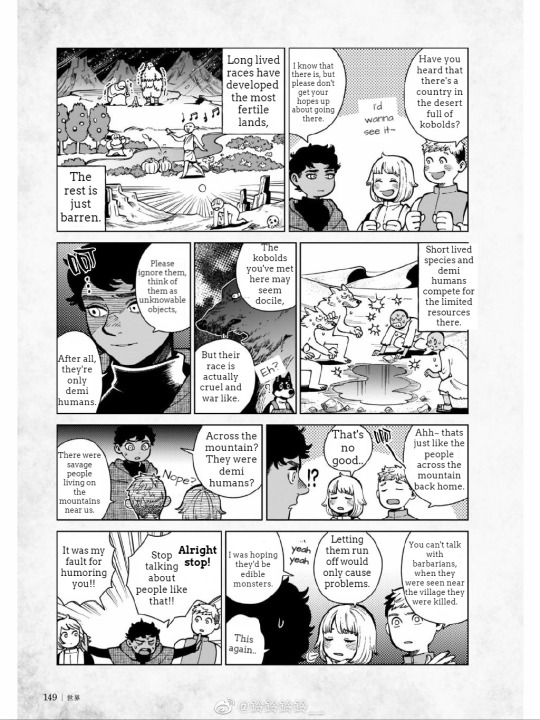
I'm including the whole thing, because I think it's an excellent and clever piece of world-building. Aside from what it says about Kabru, which I'll expand on shortly, what this extra does is deconstruct and call into question the usual "fantasy ontological biology" present in these sort of DnD-like settings. Essentially, the kind of worldbuilding where a race (such as kobolds) can be described as war-like, and that's establishing something essential about their biological nature. That's common to the point that if Kui didn't include this, some people would probably come away thinking that's the case about, e.g., the orcs.
But here, despite what Kabru is saying, the information the reader actually gets is:
the conflict between short-lived humans and demi-humans such as kobolds is mostly over access to material resources that they need to survive.
These resources are scarce because powerful nations, such as the elves, have monopolised them.
Kabru, who has grown up in a place at the centre of these conflicts, ascribes essential, negative traits to a cultural group which was in direct conflict with his own. Communication with this other group is impossible; they aren't people, they're more like objects.
oh yes! just like this conflict between groups of tall-men, a conflict which the reader will immediately interpret as more clearly analogous to real-life racism. Our other protagonists also carry prejudices from growing up in a place where a marginalised group was in conflict with the dominant group over scarce resources. It's definitely impossible to communicate with these people, and you can only kill them.
Woah, when you say it like that, it sounds pretty bad!
But also, nobody walks away having had a realisation or unlearned their prejudices - because they don't have the tools they need to do that work. Yet. I do think, to an extent, it could happen - especially with Kabru, since it's suggested in the epilogue that Melini might become a safe-haven for demi-humans.

To focus in on Kabru, the key here is his statement that you should think of demi-humans as "unknowable objects". Even his extraordinary powers of understanding have seemingly hit a limit. Part of this is just inherited prejudice, and doesn't need to have a complicated psychological explanation, any more than the elves who were prejudiced against him need one.
But also... this is probably somewhat linked to the way demi-humans seem to be considered "pseudo-monsters". They're the place that the strict delineation between the human and the monstrous is permeated. Laios, who is not interested in humans, remembers and is excited by Kuro. Chilchuck and Laios argue over whether it's OK to eat a mermaid. Kabru's prepared to (pretend to) roll with the idea that Laios ate the orcs.
But these are people, aren't they? Of course, this is a social construction, as we see from the fact that in the Eastern Archipelago, the label of "human" is reserved for tallmen, but in most of the rest of the world it depends on some obviously arbirary classification based on number of bones; "demi-humans" aren't in any essential way monstrous, except to an extent in their appearance, and physical location - due to their marginal social status, they're pushed out to live in unsafe places such as dungeons.
Therefore, Kabru's view of demi-humans as fundamentally "other", unable to be understood - monstrous - could be read as akin to abjection, the psychoanalytical concept described by Julia Kristeva. In order to create a bounded, secure superego, that thing which permeates and calls into question the border between self and other, human and animal, life and death, is rejected and pushed to the margin.
“Not me. Not that. But not nothing, either. A "something" that I do not recognize as a thing.[...] On the edge of nonexistence and hallucination, of a reality that, if I acknowledge it, annihilates me. There, abject and abjection are my safeguards. The primers of my culture.” (Kristeva et al., 1984, p. 11) “It is thus not lack of cleanliness or health that causes abjection but what disturbs identity, system, order. ” (Kristeva et al., 1984, p. 13) “The pure will be that which conforms to an established taxonomy; the impure, that which unsettles it, establishes intermixture and disorder. [...] the impure will be those that do not confine themselves to one element but point to admixture and confusion.” (Kristeva et al., 1984, p. 107) (discussing food prohibitions in Leviticus)
This is both (due to its affinity with food-loathing and disgust) a very fruitful concept to apply to dunmeshi, and a psychoanalytical theory which I wouldn't exactly cosign as True Facts About Human Psychological Development. You may also know the abject from its utilisation in the classic essay "Horror and the Monstrous-Feminine" by Barbara Creed - that's a lot more approachable than Kristeva if anyone's interested.
Key here, though, is that through the symbol of the "demi-human" is embodied a step between "human" and "monster" - and that's a prospect that puts at risk the whole notion of an absolute separation between those two categories in the first place. To Laios, that's something wonderful, and to Kabru, it's terrifying. We can see this principle further embodied in the relationship both characters have with the notion of becoming monstrous.
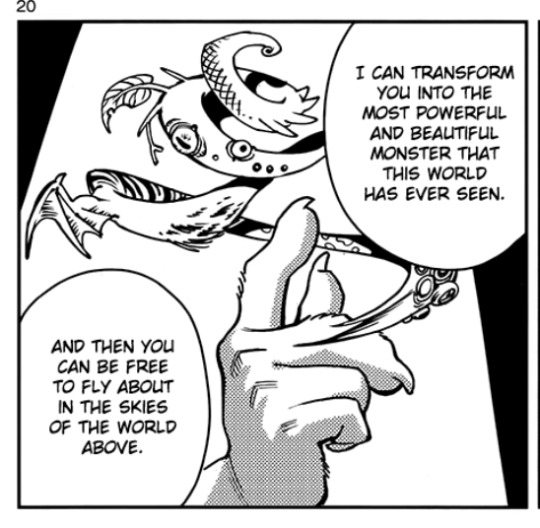
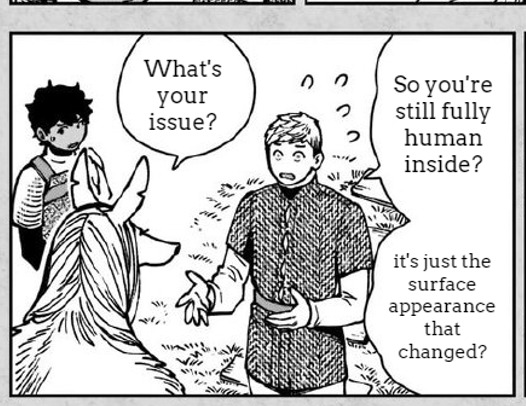
To Laios, this is transcendent, and represents a renunciation of everything human - in fact, if it didn't, it wouldn't "count".
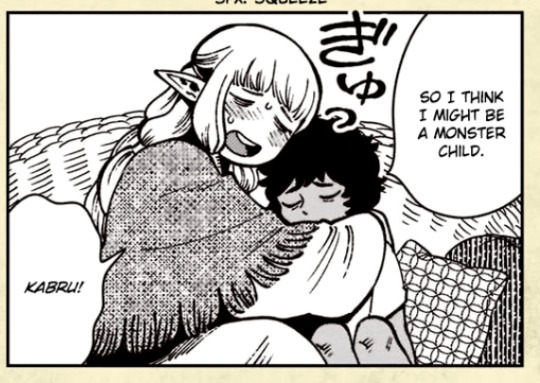
To Kabru, it's a deeply-held fear, established by his childhood alienation (due to his illegitimacy, his eyes, and perhaps also his neurodivergency), deepened by monster-related trauma and the sense of responsibility and survivors guilt he feels for what happened at Utaya. His identity as a human who is not monstrous is key to his sense of stability and safety; he doesn't want to touch monsters, he doesn't even want to see them.
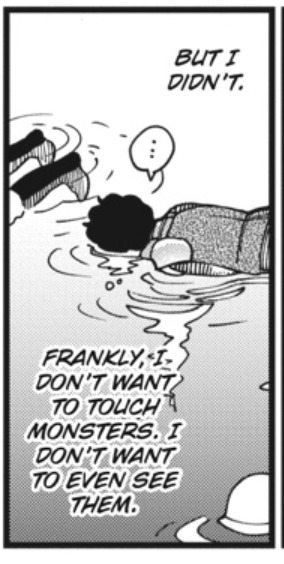
To acknowledge a kinship, a possibility of similarity between the things he loves (humans) and the things he hates (monsters) would be more than touching them - it would be putting them inside him. We know, quite explicitly, that this notion is triggering to Kabru. He literally has what seems to be a flashback when he's about to eat the harpy omelette.
So he abjects it, classifying the demi-human as fundamentally unlike him - an unknowable object, or an object that he refuses to know. Because in understanding it, he would interject the things he hates and fears into his self, which is already, always under threat by that hated and feared object.
Of course, again, Kabru isn't very good at enacting this refusal in practice. For one, when he chooses between his desires and ingesting the feared object, eating monsters... he eats monsters. Part of this is treating himself badly, the "ends justify the means" mentality. His goal is to destroy all monsters, so if he needs to become monster-like to do that, he will. But part of it is also the other motivation that he didn't even seem to know about until he said it: he wants to become Laios' friend, and to learn from him how a person can like monsters. He wants, at least in some part of him, to reconcile the feared and hated object into something he can understand.
For another:
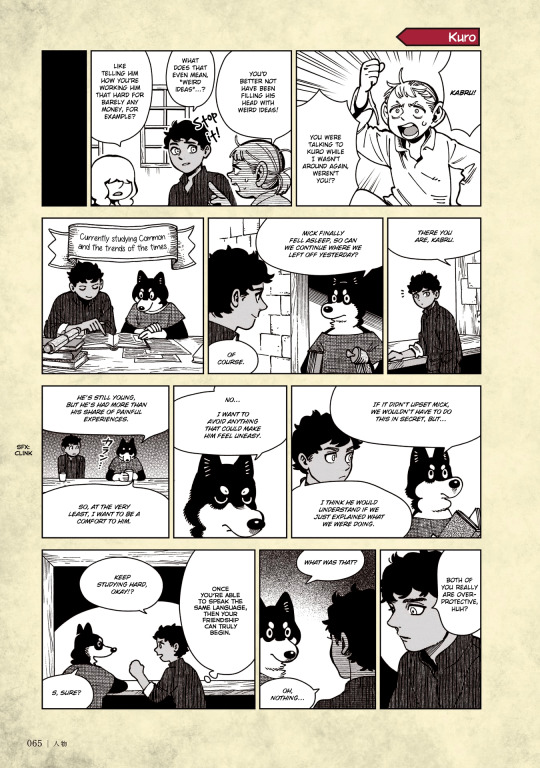
Kabru can speak the kobold language. In the first place, while this may have been common in Utaya, it also could have been something he chose to learn, an early expression of his interest in understanding and talking to all sorts of people. It isn't the kind of thing you learn if you believe that communication between yourself and the group that speak it is impossible, is it?
It's possible to harbour prejudices against a group while being kind to an individual, and given Kabru has those prejudices regardless of his reasons, that is what he is doing. But also, his treatment of Kuro doesn't reflect a sincerely held belief that he's an "unknowable object" at all. His approach is exactly the same as it is to any other person: an analysis of goal and motive, and an attempt to help if he's sympathetic and their goals align - going out of his way to give language and local knowledge lessons in secret. His conviction that Mickbell and Kuro will truly become friends when they can properly communicate is completely contradictory to any sense of demi-humans as fundamentally different, or impossible to reach mutual understanding with. To me, it seems like this self-protective shield against the corruptive force demi-humans as an idea present to his identity, this abjection, when Kabru is face-to-face with one, just simply can't hold up against his finely honed skill of intellectual empathy. Perhaps because he's autistic, it seems his "empathy" is less an emotional mirror response, and more a set of cognitive skills for analysis of others. That instinctual, emotional empathy might not trigger when presented with a member of an out-group, but if it’s possible for Kabru to turn his cognitive empathy off, we don’t see him do it.
This isn't to say that this prejudice doesn't affect his behaviour. For one, it could negatively impact his judgement of politics and policy, where individual people don't enter into it. For another, I'm not convinced he'd be willing to overlook Mickbell's exploitative relationship with Kuro if Kuro wasn't a kobold. As it is, since both of them are satisfied, he doesn't feel like he needs to intervene, regardless of the fact Mickbell isn't paying Kuro. But if Daya and Holm were in a relationship, and Holm took both Daya's and his own share from their ventures, but only compensated her in living expenses and kept the rest, do you think he'd tolerate it, for example? Even if she said it was OK?
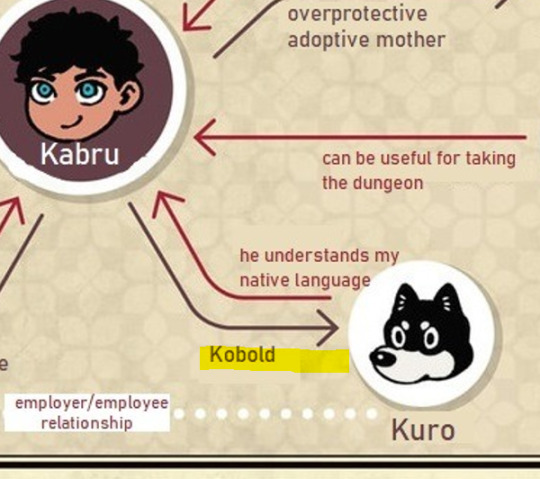
Conclusion

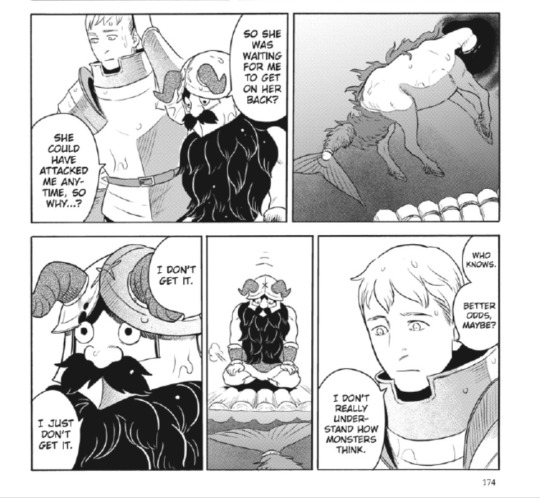
The kelpie chapter establishes that "people can never know what monsters are really thinking." That isn't just true of monsters, though.
True mutual understanding is impossible - between anyone. We can never truly understand another person's heart. This is touched on in, for example, the existence of shapeshifters and dopplegangers. Even a monster that seemed like a perfect copy of a person wouldn’t be that person, and wouldn’t be a satisfactory replacement.
We’re intended, I think, to understand the winged lion's repeated suggestions to just replace people who have been lost with copies as something uncanny, which demonstrates the way that the winged lion never manages to attain a complete understanding of humans. A version of a person who was created to fulfil your memories of them, to be the person who you wanted them to be, would be a terrible, miserable thing.
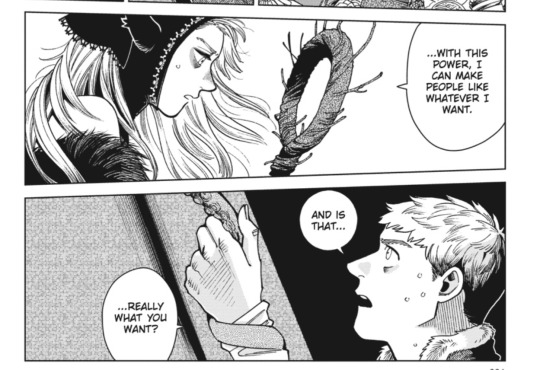
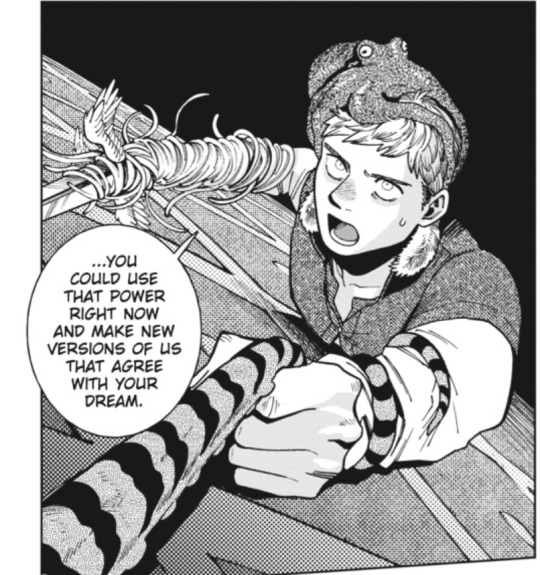

Disagreeing, coming into conflict, and misunderstanding each other, are essential parts of what it means to be living beings, as fundamental as the need to eat.
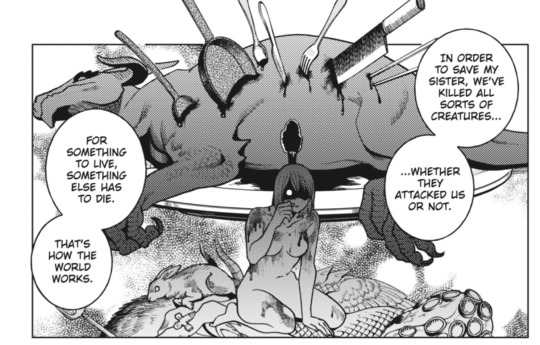
The only thing to do is not to take more than you need to eat to survive, and not impose your own desires onto others. To do your best to sincerely communicate your desires, even if they're embarrassing or vulnerable or strange, like Kabru eventually does with Laios; like Laios does, bit by bit, with the people around him; like Marcille does, Chilchuck does, Senshi does... to hope they will accept you, and do your best to understand them in return.
We can re-examine, in that context, Kabru's line about the elves' tendency to "explain nothing and take everything".
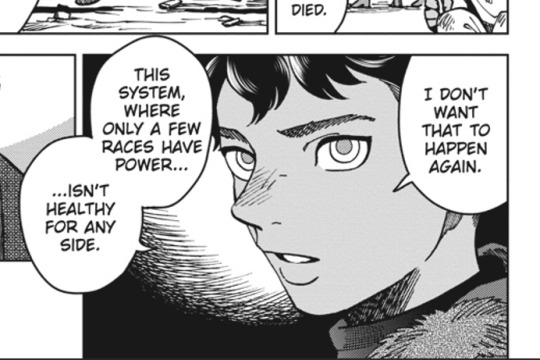
They have the power to impose their preferred "menu" onto less powerful groups. And in that context, mutual understanding being impossible just means that they won't give up their power because they're asked nicely. Kabru's goal is to seize the truth that they won't give to him, and to create a situation where they can't take everything. Because he's accurately surmised that nothing about the treatment of short-lived races will change so long as the power imbalance remains. Despite the way he mistakenly ascribes part of that to "long-lived vs short-lived" or "human vs demi-human", the actual gulfs in understanding he identifies are structural, are about power and about access to material resources and safety.
I think he could come to recognise this. Yaad is teaching him political science after all, and while a prince's lessons on political science won't exactly get at much that's radical or invested in the interests and perspectives of the marginalised (Capital is a critique of for a reason after all...) I believe in Kabru's ability to learn critically and get more from a lesson than it was intended to teach.
#og post#kabru of utaya#kabru dungeon meshi#laios touden#dungeon meshi meta#dungeon meshi#dunmeshi#dungeon meshi manga spoilers#dungeon meshi analysis#kuro dungeon meshi#the canaries#milsiril#continuing to develop my kabru theses.#literally sitting and thinking about kabru all day. rotating him.#he's in the microwave. to me.
2K notes
·
View notes